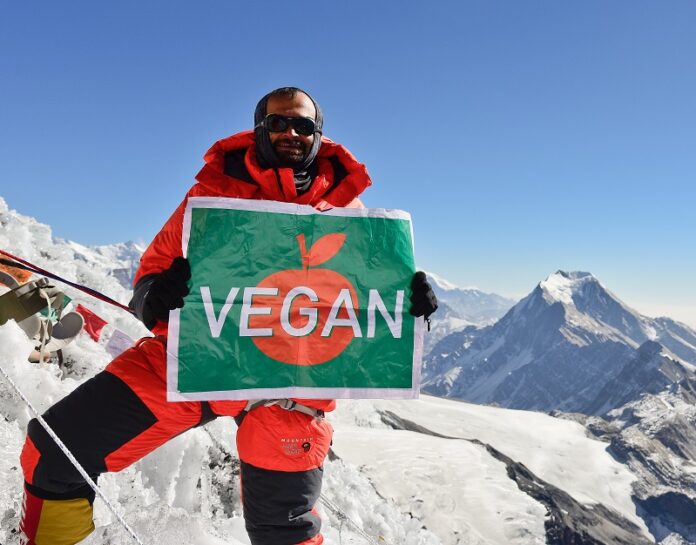The 2020 lockdown had brought the world to a grinding halt. All of a sudden, we all were confined within the four walls of our homes. The situation was ever more difficult for outdoor adventurers like Kuntal Joisher, a mountaineer who became the first vegan in the world to conquer Mt. Everest, and the first vegan to have climbed Mt. Manaslu, the eighth highest mountain in the world.
In a conversation with The Vegan Indians, Kuntal said, “When lockdown started, I had a hunch that this pandemic is not going to go away anytime soon. I also understood that I will not be able to climb any mountains in the foreseeable future. I am someone who is very goal-oriented and I need a goal to chase all the time. But this time, I took a step back and said to myself that I am now going to set a different goal, not a climbing goal.”
Kuntal has been climbing mountains for over 10 years and has conquered the Everest twice. He has achieved all these feats while being on a complete vegan diet. Born into a vegetarian family, Kuntal turned vegan in 2002. Determined to complete the Seven Summits Challenge, he undertook the last expedition in February 2020 when he climbed Aconcagua, the tallest mountain in South America. Kuntal had decided to go for his next target – Mt. Denali in Alaska – in May of 2020. But the outbreak of Covid19 and a serious shoulder injury hampered his plans.
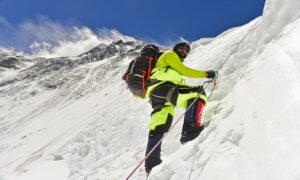


“After getting back from Aconcagua, I started working out to prepare for Denali and during one of those workouts, I injured my right shoulder. At that point, injury did not seem very extreme and I thought resting it out will make it better. I continued working out and also undertook a couple of treks in the local mountains. I made the mistake of stretching the same shoulder over and over again. It got to a point where I was unable to even lift my shoulder. I knew it was not a good state to be in, not good for my longevity or my mountain-climbing career.”
The Injury
Kuntal explained to us how treating a bone injury is different from treating a ligament tear. “Bone injuries are the easiest to treat because the bones are an amazing part of our body that heal on its own. A fracture is far better than a ligament injury or a tear in your body. Even if you do not take calcium or vitamin D, it will heal on its own within a few weeks. But when it is a tendon tear or the ligament tear, it becomes significantly harder to heal. A ligament injury may take years to heal because ligaments don’t heal on their own, so one either needs to get a surgery done, or ensure that muscles around the ligament are strengthened enough so that the latter does not come into picture all the time. One typically heals such injuries by putting on a lot of muscles by stabilising those areas and that is what I am doing – stabilising my shoulder.”
“Even after almost a year, my injuries are still not completely healed. Another thing that is very important to heal any kind of an injury is a well-balanced good diet. Besides diet, one need to do proper workout, drink enough water, sleep enough and manage stress. So, it is a holistic life choice that can help a person in treating their injury. Diet is always important, not just in injuries. If one wants to focus on longevity and living a good life, they should be following a good diet. It is as simple as that!”
Answering the Old Question in a New Way
Vegans have to face one question all the time: “Where do you get your protein from?”. Generally assumed to be protein-deficient as vegans do not consume any animal-derived products, Kuntal too had to answer this question all the time. He told us, “In spite of climbing Everest twice and climbing hundreds of mountains in the last 10 years, people still ask me this question. If I was not getting enough protein, how would I have been able to achieve all these feats? People also ask me why I do not look muscular and whether I can build muscle? I cannot deny the fact that there is a direct connection between protein and muscle or atleast there is a perception across the world that good quality protein means you can put good muscle on your body. I thought that I should answer these questions differently now.”
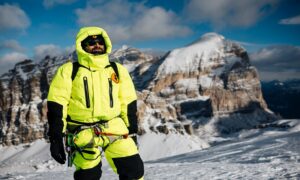


Being stuck at home due to the lockdown, Kuntal decided to answer these questions differently by actually going and showing people that muscles can be built on a vegan diet and one can put on real mass on their bodies with this diet. “I thought I am going to be muscular and I am going to be a completely different guy. All my life, I have been listening to the statement that abs are built in the kitchen. This time I wanted to give it a try and see if six packs are really built in the kitchen! Thus, a combination of multiple things led me on a completely different path. I did not have an epiphany but this decision was a result of several circumstances. This was the time when I took a step back, reassessed what my future or what I wanted to do in the future.”
He added, “Strength training or resistance training is super important to any athletes’ longevity, and sometimes as an endurance athlete, you just tend to forget that and you focus a lot more on building cardiovascular endurance. So, in some ways, in the journey I had forgotten the fundamentals, and it was time to go a step back and work on resistance training, build enough muscle in my body so that I don’t get injured in the future. That was where the shift in direction happened and a new journey started.”
Changing Tracks… and Diet
It has been around a year since Kuntal’s last mountain expedition and he has now shifted his focus on muscle building. His training and diet have changed. He said, “When I was climbing mountains, I was eating super healthy, but I did not care about how much I was eating. For 10 years perennially, I was almost on a calorie surplus because I did not have to build muscle or lean out. I was just eating healthy and listening to my body. When you are climbing big mountains like Everest, it takes almost 60 days to climb that mountain, and I have seen people lose almost 35 to 40 pounds of mass on their body in 60 days. Due to this, they are no longer able to climb that mountain because they have simply lost too much mass. I always tried to stay on the heavier side because one cannot quit eating enough calories and keep climbing at higher altitudes; it simply does not work that way! At that time, I was not counting my protein or carbs; I was just eating a well-balanced diet in order to meet all my goals.”
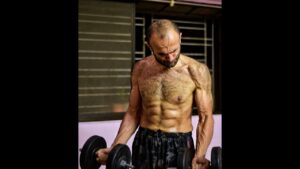


On his new bodybuilding journey, Kuntal said, “Now, when I am trying to build muscle and trying to become leaner to get into bodybuilding, I have to eat very differently. I need to ensure that I am eating proper macronutrients because now I have to eat less. The only way to lean out or the only way to shed body fat is to be a calorie deficit, and for that I need to know how much I am are eating. I am eating lesser calories now and that deficit over a period of time translates into fat loss. Now my diet is a more planned. I am eating healthy, but I am also eating a specific number of calories. Macros are very important for me because I want to retain majority of my muscle, and therefore protein has become a lot more important for me. In the last 10 years, I have never used a protein shake in my life. But in the last one year, I have lost count on the amount of protein shakes I have had. It is different in the sense that I have been eating almost two grams of protein per kg of my body and also eating a sufficient amount of essential fats and healthy carbohydrates.”
Getting the Most Out of a Vegan Diet
Kuntal mentioned that he eats everything and ensures that he eats mindfully. He gave us a glimpse into his daily diet. One of the most important food items he eats on a regular basis is oats, wheat and lentils. He takes protein powder everyday, along with 400 to 500 grams of fruits and half a kilo of vegetables. Kuntal said, “I take vegetables for my micronutrient needs and fruits for good carbs that fuel my workouts. Another thing that I practically eat almost once every two or three days is tofu and sometimes replace it with plant based meat substitutes like a soya chaap, soya tikka, or whatever is easily available. I drink a smoothie in the morning, which is basically oats mixed with bananas and protein powder. That is what I have been having the entire last year. It is a very simple diet.”
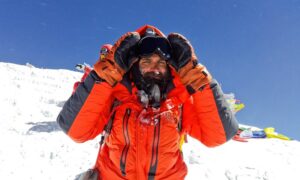


For lunch, he eats roti (Indian bread), vegetables and tofu. For his evening snack, he takes protein powder or peanut butter along with some fruits. Kuntal’s dinner comprises pasta or any regular food that is made at his home. “I always ensure that there is some amount of protein that is going in. I may eat besan ka chilla (chickpea flour pancakes) or add tofu/plant-based meat to my pasta. I want to show people that even a bodybuilding diet, which is considered very expensive even in a non-vegan world, can be followed in a simple and reasonably cheap way.”
Next Goal – A Nutrition Coach
After achieving some of the most impossible feats, Kuntal is now busy adding another feather to his hat. He is currently training to become a certified nutrition coach and later start his certification for a physical fitness personal trainer. “During the lockdown, I wanted to get a much better understanding of nutrition, personal training and physical fitness training. Thus, I got myself certified as a nutrition coach. My final exams are still pending and once I am through, I will be a certified nutrition coach. After that, I intend to begin my certification for a physical fitness personal trainer.”
But what made him go this path? Kuntal shared, “I can train people to climb mountains but many people also ask me for help in terms of exercises and diet. I can tell people what I do, but that is not the right way to coach anyone. That is what led me to understand how nutrition and fitness actually work. I want to understand body mechanics and all the science behind it. If I become a coach, I can help all these people.”
Kuntal intends to coach people on a one-to-one basis. “I want to help not just mountaineers, but anyone who would need my help, whether they are bodybuilders, vegan athletes, people on a fat loss journey or even those from non-vegan world. I want to help people with their sickness, wellness and health journey,” he concludes.


